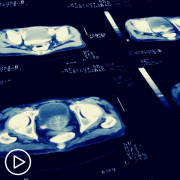What Is the Difference Between Limited Stage and Extensive Stage Small Cell Lung Cancer?
What is the Difference Between Limited Stage and Extensive Stage Small Cell Lung Cancer? from Patient Empowerment Network on Vimeo.
Limited stage and extensive stage small cell lung cancer (SCLC) are two different types, but how do they differ? Dr. Rafael Santana-Davila with the University of Washington School of Medicine explains limited stage SCLC versus extensive stage SCLC, treatment methods for each type, and the importance of communication.
See More from [ACT]IVATED Small Cell Lung Cancer (SCLC)
Related Resources:

|

|

|
Transcript:
Lisa Hatfield:
Can you explain the difference between limited stage and extensive stage small cell lung cancer, please?
Rafael Santana-Davila:
So this is actually a historical definition. Back in, I don’t know the date exactly, but somewhere in the 1980s, how we treated this was when patients…the radiation doctor could treat all the area of disease with radiation, then we call that limited. And limited stage disease means that the person, the patient can get radiation and chemotherapy with the goal of eradicating the disease. Extensive stage is when the disease cannot be treated with a single area of radiation.
In the majority of cases, there’s a very clear distinction, for example, patient has metastatic disease to the liver, that clearly is extensive, stage, but there are occasions where, limited and extensive is very hard to know and the radiation doctor would…two different radiation doctors will give you two different things.
And the important thing in this case is that this is a…all of medicine is a team sport, but treatment of cancer is more because the medical oncologists need to talk to the radiation oncologists to make sure that we’re on the same page as to what is the best treatment we can offer a patient.
Share Your Feedback:
Create your own user feedback survey










